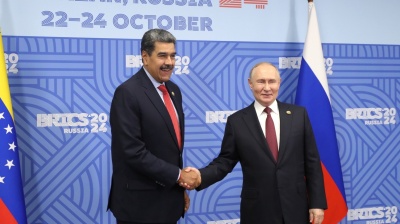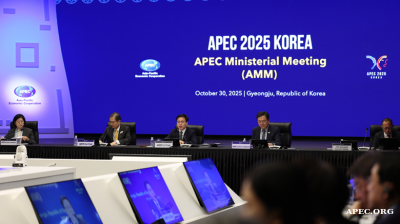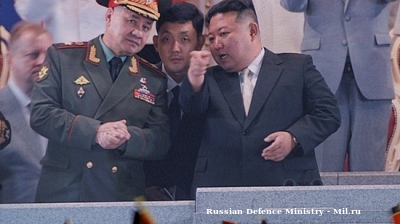If there was ever a funeral that dared not speak its name, it unfolded in South Korea late on November 1.
Under the chandeliers and choreographed smiles of the APEC summit, Asia-Pacific leaders signed a declaration that smacks less of unity and more of the last rites for the World Trade Organization (WTO).
The statement, polite on paper but seismic in omission, pointedly avoided any mention of multilateralism or the WTO - the trade system’s former cathedral now crumbling under a combination of tariff tantrums and the world’s most powerful economies weaponising supply chains.
According to Reuters, “it is a result of member countries acknowledging, at least to some degree, that it will be difficult to restore a free trade order based on multilateralism and the World Trade Organization,” Heo Yoon of Sogang University said. Translation: the WTO is not dying; it is dead - and APEC just attended the wake of the entity it helped put six feet under.
“We cannot deny anymore that there is a paradigm shift in the global trade order” he added.
It is a clear indication that even the most polite technocrats have stopped pretending otherwise.
In the sort of geopolitical theatre only APEC can provide, Donald Trump dropped in long enough to boast of trade deals with both China and South Korea, and then bolted for Air Force One and home before the summit really began. It was little more than a drive-by diplomacy cameo, complete with photo-ops and tariff threats.
Yet Trump’s shadow lingered; Washington’s fingerprints were all over the language designed to tiptoe around the death of multilateralism.
With Trump still airborne somewhere over the Pacific, Beijing wasted no time slipping into the vacuum. President Xi Jinping, ever the patient opportunist, donned the cloak of responsible stakeholder, and told delegates that China will host APEC in 2026. And in a flourish that felt equal parts techno-utopian and empire-building, as Reuters also reported, Xi proposed a World Artificial Intelligence Cooperation Organization because when the WTO collapses outright, why not build the WAICO to shape the next digital century?
China, declared Guangdong Institute for International Strategies scholar Li Xing to the news agency, is directly addressing those “worried about the retreat of the US, and China’s rise” and reassuring allies it seeks to move forward together. In doing so, Beijing is trying to show that the Chinese are the new adults in the room.
As a result, and no one wants to say it, but everyone knows - this is the end of WTO supremacy
Diplomats no doubt whispered what the declaration refused to state: the WTO has become a mausoleum. Washington has throttled its appeals court. Beijing has spent years quietly building parallel trade institutions. Middle powers have learnt how to hedge when needed, and supply chains increasingly regionalise.
Decoupling, de-risking, whatever the terminology being used - globalisation just had its plug pulled – for good.
And yet, as Heo cautioned, “few countries believe there can be a new trade order that excludes the US.”
So, even as APEC leaders pretend otherwise by signing a document as balanced as it was meaningless, it was little more than a performative nod to future shared prosperity as the global economic system splinters like cracked Ming porcelain.
Seoul’s delicate balancing act as a player between two superpowers and with one highly erratic nuclear-armed neighbour will be remembered for years to come. South Korea’s President Lee Jae-myung, only recently elected after his predecessor was ousted for trying to impose martial law, found himself caught in a diplomatic three-body problem: Trump’s swagger, Xi’s charm offensive, and Kim Jong-un’s nuclear scowl from the North. On the whole he carried it off reasonably well but will no doubt be glad it is over.
Lee first hosted Trump, showering the US president with gifts and announcing a surprise tariff-slashing trade deal tied to billions in South Korean investment in America in what was correctly reported as nothing more than political insurance against Trump’s tariff mood swings. Because of this, for the next few weeks he will have to explain himself to an opposition and wider populace across South Korea that has already taken to the streets to protest his deal.
Then came the Xi courtship: a state dinner, ceremonial optics, and pledges to “go beyond simple restoration” in the bilateral but oftentimes fraught relationship that stretches out across the Yellow Sea.
Lee pressed Xi on North Korea. Beijing’s media shrugged and pretended not to hear. Pyongyang meanwhile promptly dismissed denuclearisation as a “pipe dream” Reuters added. Trump, ever theatrical, had in the days leading up to his trip offered to meet Kim again. Kim, ever disdainful, didn’t respond and ignored the 79-year-old.
Meanwhile, Xi used his South Korean tour to meet leaders from Japan, Canada, Thailand and also Trump himself, and in doing so wrapped soybeans, fentanyl crackdowns and rare earths into a single deal that screams geoeconomic realpolitik.
As it neared its close, the summit produced declarations on ageing populations and the topic of the moment - AI. The usual technocratic mood music played in the background but avoided any solid talk of regulating the very AI tools now reshaping geopolitics.
Then, as leaders toasted so-called shared benefits, the trade world outside the banquet hall burned: export controls, semiconductor security treaties, supply chain redirection, mineral nationalism – all still need addressing.
The organisation wanted to project stability. Instead, it served up a reminder the rest of the world would do well to note: the post-Cold War trade order has collapsed, and WTO multilateralism is now a nostalgic fantasy as quaint as 1990s Davos optimism and dial-up internet.
Global commerce is no longer governed from WTO HQ in Geneva but by Washington’s tariffs, Beijing’s industrial strategy, and the nervous recalculations of everyone in between – particularly nations in Asia controlling rare earth and semiconductor supplies.
The diplomats smiled for the cameras. The communiqués spoke of unity, but anyone reading the fine print or listening to what was left unsaid, heard it loud and clear.
This was not a summit. It was a eulogy for the WTO, and APEC just lowered the flag to half-mast.
News

Turkish state grabs another fintech as company seizures continue at pace
Turkey first seizes companies, then tries the suspects. Some companies are sold before the trial process.

Ukraine’s elite HUR forces turn the tide in the battle for Pokrovsk, as Russia’s effort to capture key logistics hub fails
The battle for Pokrovsk became intense early on November 1and it looked like the fall of the key logistics hub to Russia was imminent. But a bold counterattack by Ukraine’s elite HUR forces seems to have turned the tide.

US prepares attack on Venezuela as Maduro begs Putin for aid
The Trump administration has reportedly drawn up a list of potential military targets within Venezuela as part of its intensifying pressure on President Nicolás Maduro, who has turned to Moscow seeking urgent military assistance.

Bulgaria suspends fuel exports to EU after US sanctions Lukoil
Bulgaria has temporarily suspended exports of petroleum products to European Union countries after the United States imposed sanctions on Russian oil giant Lukoil.




